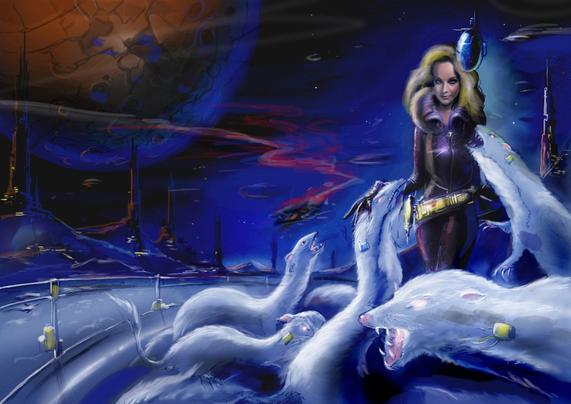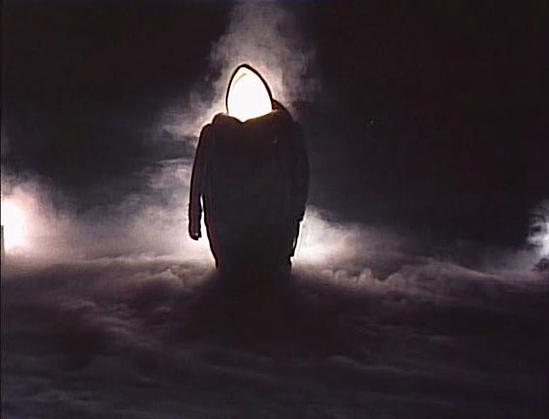The attached illustration is a scene from "Mother Hitton's Littul Kittons", a story from the book "Rediscovery of Man" that is discussed further down. Pro Tip: The Littul Kittons are psychotic mink bred for savagery. It's best not to pet them.
Dr. Retro: If you've read previous comments from me, you're aware that I'm detailed. This post is no exception. My perspective is that detailed is to be hailed. And you happen to be discussing a favorite subject.
10 is too small a number to be practical for this. 50 would work better.
Different people have different favorites. But surely most readers would find it difficult to get the number down to 10. For
#ScienceFiction and
#Fantasy #books, I myself would need to include at least the following:
#1: Accelerando - Charles Stross, 2005. Plot: To Infinity and Beyond.
#2: Another Orphan - John Kessel, 1982. A stockbroker and Capt. Ahab debate destiny and whales. Note: This is technically a book but the book version is actually two unrelated novellas. "Another Orphan" is the cover story.
#3: Blood Music - Greg Bear, 1985. A unique apocalyse. Note: Bear was one of the three great B's of the period: Baxter, Bear, and Benford.
#4: [The] Boys Who Vanished - John F. Carson, 1959. This is the rarest book on this list. I read this at age 8 and have never found an affordable copy since.
#5: Cat's Cradle - Kurt Vonnegut, 1963. Ice-Nine is Mighty Fine. Make Mine Ice-Nine.
#6: Children of the Atom - Wilmar H. Shiras, 1953. This is one of a group of 1950s "mutant" S.F. books that is more or less the ancestor of the X-Men [which was/were created about a decade later].
#7: Door into Summer - Robert A. Heinlein, 1957. One cold Winter day, IRL, Heinlein's cat started to meow. Heinlein's wife commented, "The cat is looking for the door into Summer". Heinlein said later, "I threw up my hands, told her not to say another word, and wrote The Door into Summer in 13 days."
#8: Flowers for Algernon - Daniel Keyes, 1966.
#9: Forgotten Door - Alexander Key, 1965. This is a nice dark story for 7-year-olds. It's a response for grade-school children to the same 1950s McCarthy hysteria that led to the 1950s mutant S.F. novels mentioned above.
#10: Gladiator - Philip Wylie, 1930. "Gladiator" is a dark take on Superman. It's possible that this book was one of the inspirations for Superman, though the later character was far more cheerful.
#11: I, Robot - Isaac Asimov, 1950. I ate this one up at 13.
#12: Jack of Shadows - Roger Zelazny, 1971. A forgotten classic.
#13: Little Brother - Cory Doctorow, 2008. This one is timely again this year. Especially for people in California.
#14: Lord of Light - Roger Zelazny, 1967.
#15: Martian Chronicles - Ray Bradbury, 1950.
#16: More Than Human - Theodore Sturgeon, 1953. The author at his best.
#17: Neuromancer - William Gibson, 1984.
#18: Night Land - William H. Hodgson, 1912. Yes, the book is over a century old but holds up.
#19: Postman - David Brin, 1985. Unlikely scenario, but fun to picture. Avoid the movie.
#20: [The] Power - Frank M. Robinson, 1956. S.F. with a post-WW II setting that is dated in places. There may be an updated edition out there set in the 1970s.
The existence of somebody with psi powers is accidentally revealed to a group of scientists. But can the group find out who among them it is before he or she kills all of them?
The book was made into a 1968 thriller chase film starring, of all people, George Hamilton and Suzanne Pleshette -- not known for such films -- as two of the scientists.
I've remembered a quote from one edition since I was about 13. Robinson [or the publisher] borrowed this part from a 1947 comedy film:
You remind me of a man.
What man?
The man with the power.
What power?
The power of hoo-doo.
Hoo-doo?
You do.
Do what?
Remind me of a man...
#21: Rediscovery of Man - Cordwainer Smith, 1993. The story spans 14,000 years. The ruling institutions are difficult to like, but it's the more realistic for that. The book was written in the 1950s and 1960s. It comes across as dated in some places, but remains timeless and surreal in others.
#22: Ringworld - Larry Niven, 1970. Explorers visit a small neighborhood. Actually, the surface area of the neighborhood is equivalent to that of 3,000,000 Earths. It's best to take Google Maps with you.
#23: Runaway Robot - Lester del Rey, 1965. Dated juvenile but fun as an interplanetary version of Huckleberry Finn. The teenage hero is Huck and the runaway robot is Jim.
#24: Time and Again - Clifford D. Simak, 1951. Quite eerie S.F. novel related to destiny.
#25: [The] Time Ships - Stephen Baxter, 1995. This is *the* time-travel novel. It starts out as a sequel to H.G. Wells' "Time Machine" and leaves no time-travel trick or trope unexplored.
#26: To Your Scattered Bodies Go - Philip José Farmer, 1971. The cast is simply every human being that ever lived.
#27: Time's Last Gift - Philip José Farmer, 1971. Tarzan becomes a temporal physicist.

